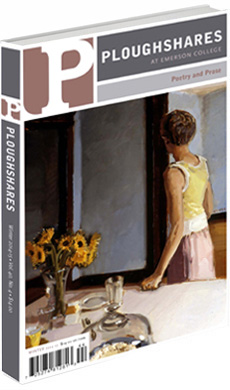Sad Jar of Atoms
Sad jar of atoms, I say when Jacqui cuts her thumb instead of a cucumber
or returns from her run wet as a dog. Sad jar yourself, she says after a
cop clocks me doing 45 in a school zone. This is called borrowing a
Byronic phrase describing life and attaching it to your beloved. We’ve
tried other terms of endearment. Vase of dolorous particles. Blue shot
glass of unstable electrons. No go. Byron crackled with knowing, and
possessed the kind of jar mopey girls in brocade dresses liked to touch
in 1812. Once, carrying our baby at my hip, my sad jar dropped pickles
in the parking lot. Being of limited means, we left the jar, but saved the
pickles. This proves sad jars can be thrifty. A praying mantis is thrifty:
watch it grab and tear much slower jars. A horse is a jar that contains
too many gallops and neighs to count. Life is a jar of maybe, of who
knows, whereby we grow older and bones turn brittle as hope. Some
jars live a long time, like sea turtles, like Benjamin Franklin, a jar of
genius filled with poor Richard and flirting in French and the desire
to electrocute the earth using a kite and key in a rain storm. God is a
jar containing all other jars—a nowhere and everywhere jar. Thy will
be done: a jar of faith we whisper to the sky, hoping it will return with
a message, like a homing pigeon. A Love Supreme by John Coltrane is
a jar of licks that moves an audience to abandon one country of sad
for a better one, all without a current passport. May all our jars be
filled with lightning bugs, if not lightning. A poem is a jar made of
sizzle and cordite. Crack it open in Greece and you’ll find the wizened
thumb of Sappho. Crack it open in Japan and you’ll find a river and
the eye of a bird, both moving, but at different rates of worship.



